Cirrus Logic's WM8742 is a stereo digital/analog converter (DAC) that provides fine resolution volume, soft mute control, digital de-emphasis, and a range of advanced digital filter responses, followed by a digital interpolation filter, multi-bit delta-sigma modulator, and stereo DAC. The device optimizes the DAC linearity and provides maximum insensitivity to clock jitter. The digital filters include several selectable roll-off and performance characteristics. This flexibility provides a range of benefits, such as significantly reduced pre-ringing and minimal group delay. The WM8742 supports PCM data input from 16-bits to 32-bits and sampling rates up to 192 kHz, as well as DSD bit-stream data format in both direct DSD and PCM-converted DSD modes.
Block Diagram
Features
- Excellent measured performance and advanced digital filters to optimize listener's desired audio profile
- Several selectable roll-off responses (standard sharp or slow roll-off) and performance characteristics (non-half band filters and minimum phase filters)
- User-selectable digital filters (5 for each PCM sampling rate, 4 for DSD Plus):
- Ripple: measure of how much the filter will affect signals in the passband
- Cut-off: frequency above/below (depending on filter type) which signal components will be significantly attenuated
- Time smear: frequency signals pass through the filter at slightly different rates from one another
- Phase response: linear phase filter may shift the phase of a signal by a large amount but will exhibit the same amount of phase shift for both high- and low-frequency signals
- Filter characteristics continued
- Latency: the delay as the signal passes through a filter; low latency filter might be necessary for time or synchronization-sensitive applications such as studio applications
- Pre-ringing: output signal reproduced by the digital filter starts to change before it is intended to due to the feedback characteristics of the filter
- Group delay distortion: changes per the input frequency of the signal
- Apodizing effect: smooths discontinuities that can be introduced by sharp filter cut-offs and provides the ability to remove distortion introduced during the recording process
- Flexibility provides a range of benefits, such as significantly reduced pre-ringing and minimal group delay; internal digital filters can be by-passed and the WM8742 can be used with an external digital filter
Direct and Plus DSD Support
- Mono and stereo configurations
- DSD Direct
- True DSD mode
- All internal filtering bypassed
- Requires an external analog filter to remove high-frequency energy present in a DSD signal
- DSD Plus
- DSD input can be manipulated internally as if it were PCM
- Advanced digital filters can be selected by the user to match requirements
- Analog filter on output can be less aggressive, and lower order, than DSD Direct
- Operates from 64 fs DSD clock – no MCLK input required
Applications
- Professional recording systems
- A/V receivers
- High specification CD, DVD, and home theater systems
